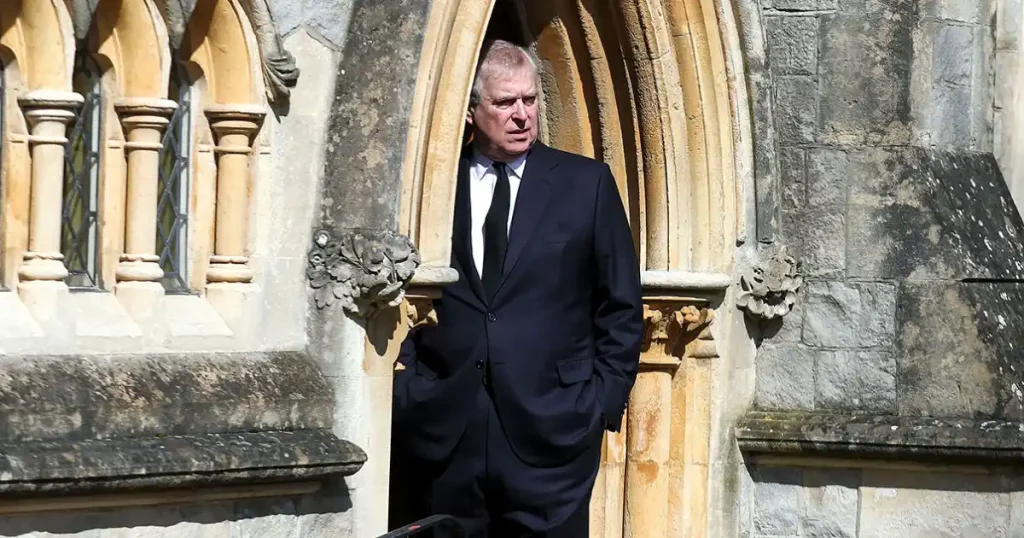Prince Andrew’s Royal Dilemma: Life After Titles
In October 2025, Prince Andrew took an unprecedented step by relinquishing his official titles amid his controversial association with Jeffrey Epstein. Despite this dramatic change in status, the Duke of York’s living arrangements at the grand Royal Lodge in Windsor remain largely unchanged, creating a complex situation that highlights the intersection of royal privilege, public perception, and historical property agreements. This 30-room mansion, nestled within the Windsor estate, has become a focal point in discussions about Andrew’s future and his place within the royal family. While he may have lost his titles, the prince retains a legally binding lease that essentially guarantees him residence in this royal property for decades to come, raising questions about privilege and accountability in modern Britain.
The arrangement between Prince Andrew and the Crown Estate regarding Royal Lodge represents an unusual financial agreement that has sparked considerable public debate. In 2003, Andrew signed a 75-year lease for the property, paying £1 million upfront plus approximately £7.5 million for renovations completed by 2005. He later paid an additional £2.5 million for a “rent buyout,” which effectively eliminated the need for traditional annual rent payments. Instead, the prince operates under what’s known as a “peppercorn rent” agreement – a legal term describing a nominal payment with almost no financial value. This arrangement requires Andrew only to maintain the property according to Crown Estate standards, with inspections occurring every five years under a “paint, paper, polish, decorate” clause. The practical result is that since 2005, the prince has enjoyed residence in this prestigious Windsor property without paying significant ongoing rent, a situation that has increasingly drawn criticism as his public role has diminished.
The historical significance of Royal Lodge extends far beyond Prince Andrew’s current tenancy. The property underwent major reconstruction between 1830 and 1840 after serving various royal-adjacent figures in the 18th century. By the mid-19th century, the Crown Estate had assumed ownership, and in the 1930s, King George V granted residence to the future King George VI. Following the coronation of Queen Elizabeth II in 1953, the Queen Mother became Royal Lodge’s primary occupant until her death in March 2002. At that point, the estate had fallen into significant disrepair, making the Crown Estate’s “peppercorn rent” agreement with Prince Andrew mutually beneficial – he would invest in much-needed renovations, saving taxpayers from funding the work, while securing a prestigious royal residence for essentially his lifetime. Since then, Royal Lodge has hosted significant family events, including Princess Eugenie’s wedding reception in 2018 and Princess Beatrice’s wedding to Edoardo Mapelli Mozzi in 2020 at the adjoining Royal Chapel of All Saints.
Despite mounting pressure and speculation, Prince Andrew’s eviction from Royal Lodge appears legally impossible without his consent. BBC News confirmed in October 2025 that Andrew possesses an “cast-iron lease” on the property, independent of his royal status. Having fulfilled all financial obligations under his original lease agreement, he retains the right to continue residing there with minimal rent obligations through 2078 – effectively for the remainder of his life. The Times reported that if Andrew were somehow persuaded to surrender his lease, the Crown Estate would be required to compensate him substantially – £558,000 upfront plus annual payments of £185,865 through 2028. This financial reality, combined with the legal strength of his lease, means that despite no longer being an active royal, Andrew maintains significant leverage regarding his residence. The situation underscores how historical property arrangements can sometimes conflict with changing public expectations regarding accountability and privilege.
Royal expert Christopher Andersen has suggested that maintaining tenancy at Royal Lodge represents one of Andrew’s few remaining sources of control amid his spectacular fall from grace. “Gradually, since the Queen’s death, it has dawned on Andrew that he might really be booted out of the royal fold altogether,” Andersen told Us Weekly in October 2025. “His titles, his privilege, his status all mattered to him. That has all been peeled away over the last few years and now he’s just hanging on by his fingertips.” For the disgraced prince, Royal Lodge represents more than just a home – it symbolizes his continued connection to royal life and the privileges he once took for granted. As other aspects of his former status have been stripped away, his lease on this prestigious property remains a tangible reminder of his royal heritage and a crucial element in maintaining his preferred lifestyle.
Prince Andrew’s situation at Royal Lodge illustrates the complex interplay between modern expectations and historical royal arrangements. While public sentiment has shifted dramatically against the prince following his association with Jeffrey Epstein and subsequent legal troubles, the property agreements established decades ago continue to provide him with significant housing security regardless of his standing within the royal family. The “peppercorn rent” arrangement that once seemed a practical solution for renovating a deteriorating royal property now appears to many as an undeserved privilege for someone who has stepped back from royal duties under controversial circumstances. As King Charles continues his efforts to modernize and streamline the monarchy, Andrew’s continued residence at Royal Lodge stands as a reminder that change within royal institutions often moves slowly, constrained by legal agreements and historical precedents that can outlast shifts in public opinion or even family dynamics. For now, Royal Lodge remains Prince Andrew’s sanctuary – a magnificent reminder of what he has lost and what he still, despite everything, manages to retain.


